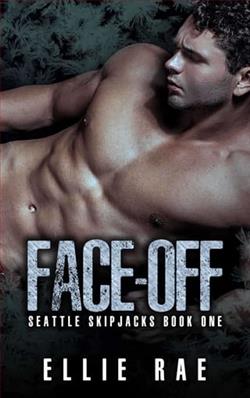Page 14 of Star Champion
Another rock sang past her head, and she ducked. As a tugger, it was her responsibility to protect the load. It did not matter if she was firing at plains pirates or scurries; she was paid to defend the trill.
She hunkered down, tracking the red laser sight across the bustling little bodies. “That was a warning shot! Next one’s for real.” In the crosshairs she saw some of the small, smudged faces up close. Hungry little kids, dressed in rags.
“Crat,” she muttered. “Craggin’ crat.”
Jemm knew that the scurries were gangs of feral children and orphans, but the reality had not hit until seeing them in the flesh. They were so small. So young.
Your instructions are clear: shoot to kill.
A sick feeling made her gut clench as the scurries tipped the canister out of the trailer. Culled from the herd, it hit the ground with a resounding bang. The lid was quickly unscrewed. Trill spilled out, silver chips the size of ketta-cat paws scattering over the rocky ground.
The children squealed like someone had thrown candy.
No one was hurling rocks at her anymore. They were filling their pockets and little sacks with as much of the extremely heavy ore their tiny bodies could carry. One of the youngest girls tucked her hair behind an ear as she bent over to pick up a chip, her eyes round with delight as she snatched her prize.
She’s just a little girl. Jemm’s chest squeezed tight. If circumstances were different, that could be her child. Anyone’s baby. It could be Button out here.
Jemm gripped her weapon, two-handed, her finger on the trigger. She was to exterminate any and all ore thieves on sight. Company orders. The directive felt like a knife pressed to her throat. Yet, in her failure to act, she might as well be daring the mine bosses who held sway over nearly every aspect of her life to go ahead and finish her off.
“I can’t,” she whispered.I won’t.
She refused to murder children.
The decision was like a release of pressure off her soul. Air escaped her lungs as she sank heavily into the driver’s seat, her weapon in her lap, her body quaking as the miniature pirates scurried away into the night.
People. People everywhere, pushing, shoving, fighting, shouting, offering all manner of vices for sale, barter, or trade. As Klark made his way with Skeet and Xirri from the docks to the area known by the locals as Central City, he felt more like a fish swimming upstream in a polluted, debris-clogged river than a gentleman going out for the evening.
The tour ship had dropped the two players off before continuing on to other already scheduled worlds. It gave the pros a few days to spend with Klark.
He tracked down the bar where Sea Kestrel was scheduled to play. It was not a long walk, and he could have hired a hovercar to drop them off near the bar. But, he knew better than to flaunt his means, especially when his goal for the trip depended on discretion. Although woolen cloaks worn over plain trousers tucked into dull black boots in most circumstances would not attract attention, Klark was aware that he and his companions nonetheless stood out on these streets.
He pressed the sleeve of his cloak to his nose, if only to reassure himself, with the residual scent of soap, that clean laundry still existed. The air smelled even worse than he remembered: a foul cocktail of sweat, dust, overworked machinery, and something putrid, either human waste or rotting food, or both. That he was parsing out the colony’s stench into its individual components was the surest sign yet that he had lost his mind when he decided to return.Oh, my Sea Kestrel, you had better be worth it.
“We’d blend in better if we hadn’t showered for a month,” Skeet stated, having picked up on his thoughts. “Don’t they ever bathe? There’s got to be running water if they want it. There’s power, obviously. Look around. They’ve got downtown lit up like a carnival.”
“Now do you see why I offered you gentlemen a last chance out?”
Skeet laughed. “We’ll know who to blame if this turns out to be for naught.”
“Sea Kestrel?” Xirri asked, slinging a playful arm over his teammate’s shoulders. “Or you, Skeet?” They tussled briefly before parting.
As the two athletes chatted and laughed, he felt as if he were observing the scene through meter-thick observation glass; he could watch but was unable to participate.
Not unable—merely unsure how to join in. Such lighthearted behavior was a concept foreign to Klark. He had never before traveled in the company of friends, and not since boyhood had he cavorted in any fashion, not even with Ché. The responsibility of being Vedla born and bred was too heavy a weight on their shoulders, although after Uncle Yul’s rebuke, much of the fun was leached out of frolicking with his elder brother, anyway. As the years went on, Klark had simply fallen out of practice when it came to feeling carefree. Yet, he already felt unusually lighter in spirit for having stepped outside his usual boundaries.
Even if it was on Barésh.
They rounded a corner and navigated through the grating din of a street full of virtual reality arcades. Every one of the arcades was packed to overflowing with patrons willing to part with their precious coins for a temporary escape.
“Poor clods. Who can blame them?” Xirri looked openly appalled by the spectacle. “If I had to live here, I’d be right there with them, plugging in and tuning out.”
“I’m ready to pay to play right now,” Skeet grumbled.
“Luckily, here we are,” Klark said. He held out an arm to stop his players in front of the entrance to the bar. Narrow Margin was a working-class establishment, not bottom-rung but not a place frequented by wealthier citizens either. Outside, banners boasted of tonight’s bajha matches:Bajha Nightly! The Best Players and the Best Odds in the Colony!
“Narrow Margin, eh? Fitting name.” Skeet smirked as they pushed through the door and elbowed their way to a reserved table overlooking the ring that a bribe had gained them. “There isn’t enough room to inhale.”
“Just as well,” Klark said dryly. “I don’t recommend breathing any more than you have to.” Despite a ventilation system working so hard it sounded like it was wheezing its last gasps, the stench of vapes, liquor, and body odor in such confined surroundings was quite unpleasant. Yet, it did not seem right to mock the locals for their hygiene when it was clear the situation for many of them was quite dire. Where were the Earth-dwellers? It was his impression that Earth would take charge of mopping things up now that they wore the mantle of supervising the frontier’s fringe worlds. The newest member of the Trade Federation had certainly whined loudly enough about wanting the responsibility after members of their government witnessed the wretched conditions on Barésh. TheVashbore the full blame for centuries of neglect, it was true, revealing a flaw they were striving to correct in their culture, but if there was any justice in the galaxy, the Earth-dwellers would be able to improve the lives of those who lived here. After all, these miners performed an important job: The Trade Federation needed trillidium.















